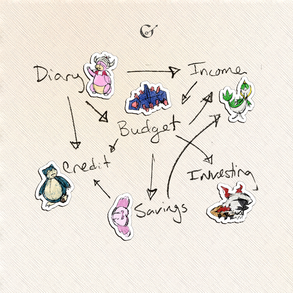 In Pokémon, a trainer travels collecting and training pokémon to battle other trainers. In most of the regions, trainers compete in a league of eight gyms to receive badges. Each badge grants the trainer a new license for using moves outside of battle and encourages their high-level pokémon to listen to them. Once they have all eight badges, they can then battle the Elite Four for a chance to enter the hall of fame. After earning their spot in the hall of fame, the league registers the trainer and their Pokémon and the credits begin. In order to complete this journey, trainers must build a pokémon team of six pokémon. The strategy of building a pokémon team becomes important to the team’s success. The possibilities seem endless with over 800 known pokémon species and numerous differences between individuals within each species. Trainers develop their teams in different ways, but all of them do so to win. The same is true for personal finances. We use a financial management structure made of tools to help us manage our money. I call this structure our Financial Pokémon Team. We build our financial pokémon teams with a strategy that allows us to pay our bills, make purchases, afford trips and save for the future. Having a financial management structure is as important to our personal finances as having a pokémon team is to playing Pokémon. What are the Financial Pokémon? Financial pokémon are the different financial tools that help us manage our money. There are tools that use tangible, or “physical”, money such as bank accounts, paychecks, and cash. There are also tools that are theoretical, or “special”, money such as credit cards, loans, and investments. Finally, there are the tools that we use to help us with our money such as a wallet, smartphone apps and envelopes. Basically, anything that you can use to help you manage your money could be a financial pokémon on your team How My Financial Pokémon Team Works My financial pokémon team is made up of my budget, financial diary, income, savings, credit and investing. I built my team to guide me on how to use any money I receive.  My budget is the sturdy base of the whole team. All of my money needs to pass through the hands, or the rock feet if you will, of my budget before I may use it. My budget makes sure everything, including bills, gets the money it needs to keep moving forward. My diary influences my budget, my income, and my credit by giving them advice. It plans the future of my personal finances and can see the big picture. My income funds the team and gives all of my money to my budget for distribution. When it gets money back from the budget, it becomes the first line of offense when making purchases. It is pretty reliable, but it doesn't necessarily have the strength I want to make all of my purchases. My credit is my income’s powerful backup. It uses little effort to strike a damaging blow but takes more effort to restore its energy and strength. My budget feeds it a lot of money each month to keep its power up. My savings safeguards my team from status conditions. If my income or credit need restoration, my savings is prepared to help. My investing is the most recent member to join the team. Right now, I want it to train with the team to gain some experience. It has a long way to grow before it evolves into a powerhouse. Team Variations In Pokémon, trainers build their teams with many different strategies. For some trainers, it can be as simple as “I like cute and adorable pokémon”. For others, they need six pokémon with maxed out IVs. Every trainer is different and each builds a team that works for them. I like to build a team with a strong physical attacker, a strong special attacker, two that are strong physical and special attackers, and two that have strong defenses. The same way trainers strategize their pokémon teams, we also develop strategies for our financial pokémon teams. With all of the different tools available to us today, it’s important to figure out what strategies work best for you. My team’s strategy distributes my income according to my budget to pay bills and spend some on extra payments towards my student loans and credit cards. Once my budget has everything paid that it wants, I can use the leftover money however I want. My fiancé’s team's strategy is a little different. He uses his paycheck to pay his most recent bills, puts some in savings and then uses the leftover money however he wants. Simplicity and Effectiveness I think what makes pokémon teams so strong is that they are limited to six pokémon. It forces a trainer to consider how to keep their team simple while still being effective. When building our financial pokémon team, we receive a similar advantage by keeping it limited. With a structure that is too complicated, we start to resist or become truant. As for my team, I keep it simple by combining tools together to act as one financial pokémon. My Acorns and my IRA Roth are combined into my investing. My income is a combination of two checking accounts. My budget uses one account to distribute funds out of, and my weekly groceries use the other account to receive money in from my budget. The tools that create each financial pokémon share similar qualities and follow the same principles. Financial Pokémon Teams are something that we all use whether we think we do or not. They help us manage our money to protect us from wild bill pokémon and other surprise financial battles. We just have to figure out what works for each of us in our current stage of our life journey and use it to help us reach for our financial hall of fame. Let’s Chat: How would you describe your financial Pokémon team? Further reading: Money Structure 101: How To Organize Your Money... When You're An Unorganized Artist- Rags to Reasonable
6 Comments
5/16/2023 07:11:15 am
In this article, I saw a lot of great info on how passionately this traveler collects badges and how he can enter the Hall of fame. This is crazy, to be honest, and not something that I am interested in. Hoping to see some relevant content next time
Reply
6/17/2024 07:11:15 am
Your appreciation means a lot! It's like putting together a puzzle—finding the perfect word is like finding that missing piece that completes the picture of your writing. Keep practicing, and you'll definitely see progress!
Reply
Leave a Reply. |
Bag Pockets
All
Blog
|
© 2016-2018 Tojo Designs/The Grown-Up Pkmn Trainer
Most images created for this blog are derivative works based on the copyrighted property trademarks, of The Pokemon Company Internationl, Inc. © 2018 Pokémon. © 1995-2018 Nintendo/Creatures Inc./GAME FREAK inc. Pokémon, Pokémon character names are trademarks of Nintendo.
Most images created for this blog are derivative works based on the copyrighted property trademarks, of The Pokemon Company Internationl, Inc. © 2018 Pokémon. © 1995-2018 Nintendo/Creatures Inc./GAME FREAK inc. Pokémon, Pokémon character names are trademarks of Nintendo.

 RSS Feed
RSS Feed